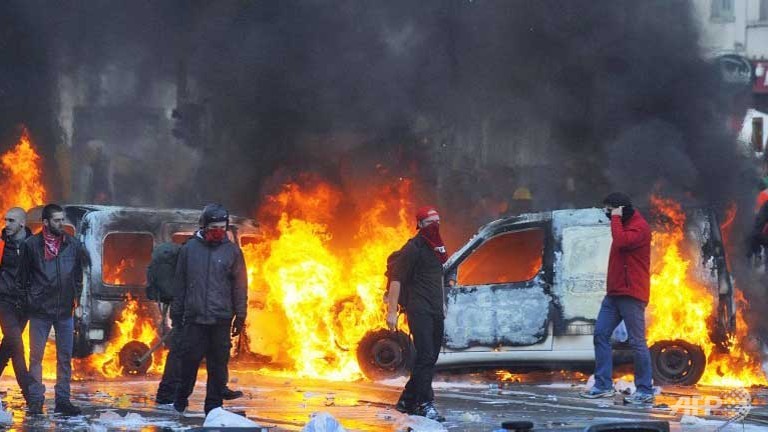Clashes in Belgium as 100,000 protest against new government

Demonstrators clash with riot police in Brussels in the first mass protest against the new centre-right government's austerity policies. (AFP/JOHN THYS)
BRUSSELS: Belgian riot police fired tear gas and water cannon during clashes with demonstrators on Thursday (Nov 6) as at least 100,000 people marched through Brussels in the first mass protests against the new government's austerity measures.
Protesters danced on the top of overturned cars and threw paving stones and fireworks during the protest, which opposes economic reforms announced by Prime Minister Charles Michel's centre-right coalition.
Riot police armed with clubs and shields charged the rowdiest groups of demonstrators, who also set rubbish bins on fire and made makeshift barricades, AFP journalists witnessed. Paramedics treated at least one protester, who suffered a broken nose.
The rally is the first in a series of measures planned by Belgian trade unions including strikes in several provinces in coming weeks, followed by a general strike throughout the kingdom on Dec 15.
Police said there were at least 100,000 demonstrators in Brussels while the unions said up to 130,000 protesters showed up. Rail companies had sold low-cost tickets to increase protest numbers in the capital.
PROTESTS HIT CAPITAL OF EU
Public transport services were restricted because of the protests, partially paralysing the capital of the European Union on a day that finance ministers from countries that use the euro were gathering there. Member states like Greece, Spain and Italy have also experienced violent protests against austerity.
The cabinet planned to hold a crisis meeting with the three main unions later Thursday
The Brussels rally as a whole was peaceful, bright and noisy as crowds of people wearing union reds, blues and greens marched through the boulevards, holding banners, throwing firecrackers and whistling.
Workers and staff at steel firms, the ports of Antwerp and Zeebrugge, the post office and in education were also planning to stage a work slowdown.
"The whole raft of government measures create a potentially explosive cocktail," Marie-Helene Ska, secretary general of the leading Belgian union, CSC, warned earlier in the newspaper Le Soir.
Belgian unions as well as the socialist, green and extreme left parties oppose a decision to scrap plans for the usual automatic cost-of-living raises next year. They also reject plans to raise the retirement age from 65 to 66 from 2025 and to 67 in 2030.
'UNFAIR MEASURES'
"I am 50 years old - another 17 years of work is too much," said Ralph Lauwmans, a school headmaster from the Flemish-speaking northern area of Flanders, told AFP during the protest.
The new government also aims to cut costs in the civil service as well as in the fields of culture and scientific research, with expected savings of €11 million (US$13.6 million).
"We have made an agreement on a government and an agreement on a budget which will balance Belgium's books by 2018," the 38-year-old Michel said last month after the coalition was formed.
The coalition groups three Flemish parties - the nationalist New Flemish Alliance, the Christian Democrat CD&V and the liberal Open VLD - and Michel's French-speaking liberals.
"The cocktail of measures proposed by the government is particularly unfair," Solcialist leader Laurette Onkelinx said during the protest.
The last large nationwide demonstrations against austerity were held in February 2013 attracted up to 40,000 people.
The new government is likely to face the same problems as before, most notably the unavoidable division between Belgium's Flemish-speaking north, which tends to be more conservative, and a French-speaking, more liberal south.
Over the years, greater powers have been devolved to the regions to ease communal tensions, with separate governments elected in Flanders, Wallonia and for the bilingual Brussels capital region.
What the stars mean:
★ Poor ★ ★ Promising ★★★ Good ★★★★ Very good ★★★★★ Exceptional
Latest News
More News
- Russian President congratulates Vietnamese Party leader during phone talks (January 25, 2026 | 09:58)
- Worldwide congratulations underscore confidence in Vietnam’s 14th Party Congress (January 23, 2026 | 09:02)
- Political parties, organisations, int’l friends send congratulations to 14th National Party Congress (January 22, 2026 | 09:33)
- 14th National Party Congress: Japanese media highlight Vietnam’s growth targets (January 21, 2026 | 09:46)
- 14th National Party Congress: Driving force for Vietnam to continue renewal, innovation, breakthroughs (January 21, 2026 | 09:42)
- Vietnam remains spiritual support for progressive forces: Colombian party leader (January 21, 2026 | 08:00)
- Int'l media provides large coverage of 14th National Party Congress's first working day (January 20, 2026 | 09:09)
- Vietnamese firms win top honours at ASEAN Digital Awards (January 16, 2026 | 16:45)
- ASEAN Digital Ministers' Meeting opens in Hanoi (January 15, 2026 | 15:33)
- ASEAN economies move up the global chip value chain (December 09, 2025 | 13:32)
















 Mobile Version
Mobile Version